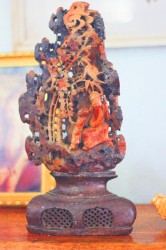This year marks the 160th anniversary of the arrival of the first Chinese in Guyana. Stabroek News commemorates the occasion with the publication here of some historical features (reprinted from earlier editions of our newspaper) and an interview with a descendant of the original Chinese immigrants, as well as with a representative of more recent arrivals to these shores.
When Loo Shee left her homeland China in 1861 it was in desperation and to ensure that she saved the lives of her three children and herself as her husband and many others had been killed.
She arrived in Guyana on May 12, 1861 and quickly remarried, interestingly, to a man who was once part of the group that slaughtered Chinese back in China but who later fled because he himself was being sought. With him she bore more children.
Loo Shee, who could possibly have been a member of the upper class in China because of her very tiny feet, but who may have been captured and put to work as a servant, died many years ago but her generation and their successors have contributed to the rich diverse culture of this country.
One of Loo Shee’s descendants is her great granddaughter, well-known caterer and historian of the Chinese in Guyana, Margery Kirkpatrick, who is also the Vice-President of the Chinese Association and owner of Kirkpatrick’s Catering.
Kirkpatrick speaks no Chinese and has only been to China once, as recently as November last year, but she is proud of the contributions her ancestors made to the building of Guyana, and like many of those of Chinese ancestry observed the 160th anniversary of Chinese arrival in what was then British Guiana, on January 12.
The first Chinese came to Guyana on that day in 1853 but initially only men were allowed to come; however, in 1860 women were allowed to make the journey and it was the very next year her great-grandmother fled.
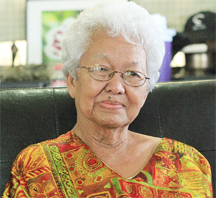
Sitting in her Jamoon Drive Meadowbrook home surrounded by a display of Chinese ware and other items of Chinese origin, including one side of the tiny shoe worn by her great-grandmother, Kirkpatrick willingly recounted the coming to Guyana of the first set of Chinese and how their generation contributed to the country.
“There were several different types of Chinese who came, basically they were running away from China that’s why they came in 1853 to 1879,” Kirkpatrick told Stabroek News in a recent interview.
She recalled, however, that the first set of Chinese were sent here by Admiral Hope of the British High Commission in China because many of them were Chinese of the upper classes who were trying to escape to a new land. She said they were sent to Austin Perry − the then Bishop of Guiana. They wanted to escape China because they were being murdered in the Taiping Rebellion. “My great grandmother had just had her husband killed and she didn’t know what had happened to her older son, and she came here,” Kirkpatrick said. She recalled that Loo Shee came with her three remaining children.
“When she came here, her feet were so small the servants in the home wrapped it with cotton to make it appear to be a bigger foot and fit in ordinary sized shoes so that nobody would have noticed her feet were small and that she must be of a higher class,” she said. She explained that in those days when your feet were tiny it meant that you were rich, and their feet remained small from the custom of applying painfully tight binding to the feet of young girls to prevent further growth.
While in Guyana, Loo Shee married a man who was supposed to be Prince Chung but in fact his father and his uncle were in the group that started the Taiping Rebellion and the authorities were looking for him to kill him, but he escaped using the false name Lee-a-Tak.
According to Kirkpatrick, her great grandmother knew the true identity of her husband but she wanted to save her sons, so she married him because she was not sure whether he had come to Guyana to kill her children: “The two of them were married here and then she had two [more] children.”
But even before she married the supposed Prince Chung, she had married another man on board the ship that brought them to Guyana who was imprisoned because he could not work owing to illness, and he later died.
‘Could not understand’
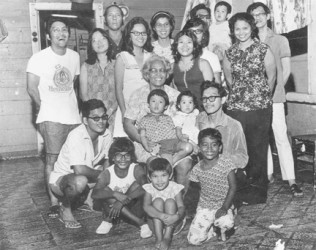
Kirkpatrick said while the Chinese came to Guyana to start a new life, initially it was one they could not understand because they did speak any English.
“It was a life they could not understand because they could not speak the language; they didn’t have their own foods to eat, they did not have their clothes to wear. All of those things made it very difficult for them,” she noted. But eventually they managed to make a life because they “set out to live in Guyana” and they knew they were not returning to China and would die here.
And Loo Shee, according to her great grand-daughter, made up her mind to learn the language and how to survive in Guyana and “she did just that through trying to make herself okay that she could live here.
“She did it deliberately, and that’s how she got on. She could embroider so she [did that]; everything that she could do she did it… and she learnt to speak English, not a lot of words but the little bit that it took her to understand what was happening and to speak to others,” Kirkpatrick said of her great grandmother.
Interestingly, she did return to China in 1904, but later returned to Guyana where she lived until she died. She had gone, Kirkpatrick explained, because her great grandfather became ill, and according to custom he was supposed to be buried with his family when he died. Loo Shee therefore took him back to China along with one of her sons and his family and they located her husband’s home.
“They found her husband’s home and they tried to get established back in the family, but it was very difficult because being by themselves they had learnt how to get on without the whole family on their backs, so it was difficult and they couldn’t quite adapt back to that type of living,” Kirkpatrick explained.
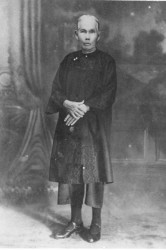
“They couldn’t live there,” she said of her great grandmother and her son (her husband was by this time dead and buried) adding that all of that son’s children live in Canada now and are doing very well.
Loo Shee lived with her daughter − Kirkpatrick’s grandmother − when she returned until she died and was buried at Plaisance.
“So that is how we came and that was how we settled…” she said.
St Saviour’s Anglican Church in Saffon Street was opened in 1874 to Chinese Christians and Kirkpatrick said her family has worshipped there ever since and at present she is the lay-reader at the church.
But Kirkpatrick said while growing up it was very difficult to make friends, as the children would say, “She is Chinese,” as if being Chinese “meant that I was mad or something.” But she said now things have changed and that is no longer an issue as the children see each other as their friends and not Chinese or anything else.
‘Have to be the best’
And according to Kirkpatrick, Chinese people have this belief that have be the best at whatever they do. She named that young Berbice batsman Jonathan Foo as a prime example of this, pointing out it is not known that Chinese play cricket but he took it up and quickly become known for his explosive batting. “All he does is play cricket but he wants to be the best,” she said, naming another Chinese “Rudy Luck” (Joseph Rudolph Spencer Luck an attorney-at-law, teacher and politician who died on September 2, 2001) whom she said was a teacher but wanted to be the best and one whose ideas could work; he later become a diplomat. There is also the late president Arthur Chung who was the first president of Guyana and Kirkpatrick said many persons are unaware that Guyana’s first president was Chinese. She also named acting Chief Justice Ian Chang as another person of Chinese ancestry to note.
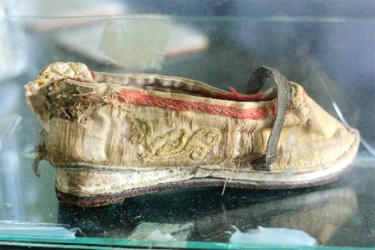
“It is that little thing inside of us that makes us become ‘this is what I am’ ‘this is what I do’ and all you could do is sit and admire, there is very little you could say,” she remarked. Kirkpatrick said it is not that the Chinese want to be better than others, they just want to do their best at whatever they do.
She said many people do not realise that Guyana has so many Chinese working in important areas simply because the Chinese themselves “did not push it; we are Guyanese, we don’t look at ourselves as Chinese… because we lived here too long.” She pointed out that many of the Chinese now are mixed with many other races.
‘New Chinese’
But she admits that in recent years there has been an influx of “new Chinese” and she puts this down to them seeing how well “we live here and they have come trying to be like us and trying to fit in society.”
But unfortunately, she said, because they do not “try harder” to speak English they are missing that “little bit” to really be part of the Guyanese society. She noted that most of the Guyanese Chinese cannot speak the languages of China and it was their ancestors who
had from the inception worked hard to speak English.
She said it is a pity that the ‘new Chinese’ are not trying harder to speak English, but she also noted that the native Chinese also do not make real attempts to speak to those Chinese nationals that have come in recent years. She confessed that even she does not “try hard enough” to speak to them, pointing to the fact that she cannot speak Chinese and “so I don’t worry.”
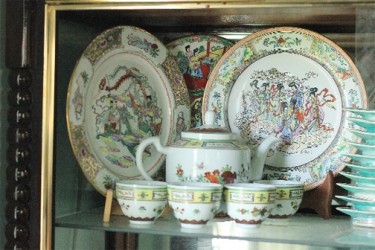
Because of this, sadly, there is a disconnect between the Chinese who have recently come from China and those who were born here, and Kirkpatrick said the ‘new Chinese’ may be getting the “wrong edge of the brush.”
She is proud of how the ‘new Chinese’ have been able to establish themselves in the business community and according to her this is owing to the fact that they are the ones “who will eat rice and salt as they try to establish themselves.” Those Chinese who were born here, she said, are no longer interested in trying hard enough because they are comfortable just living here.
“It is the new Chinese who are really fighting for a living,” she observed.
For the children of the ‘new Chinese’ it is better for them since they attend school and will learn English but in some cases when they become “too Guyanese” their parents will send them to China.
“A girl or a boy will be here today and then two days after they do something that upsets
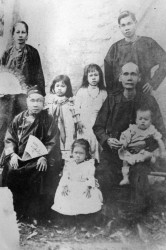
the father and he just picks them up and sends them home…,” Kirkpatrick noted.
